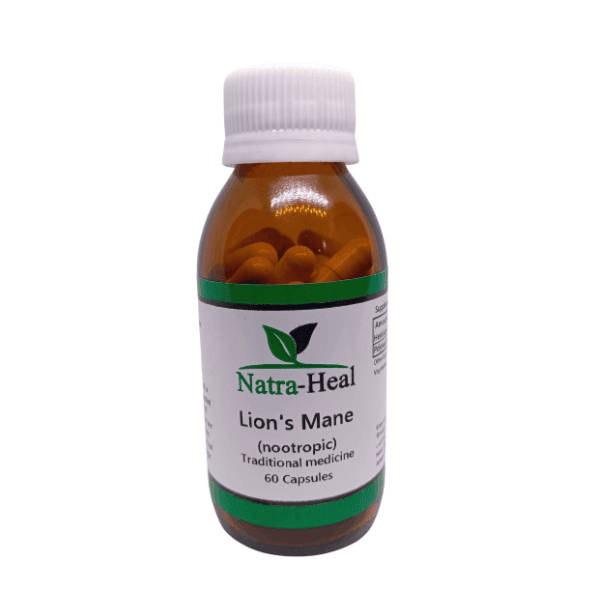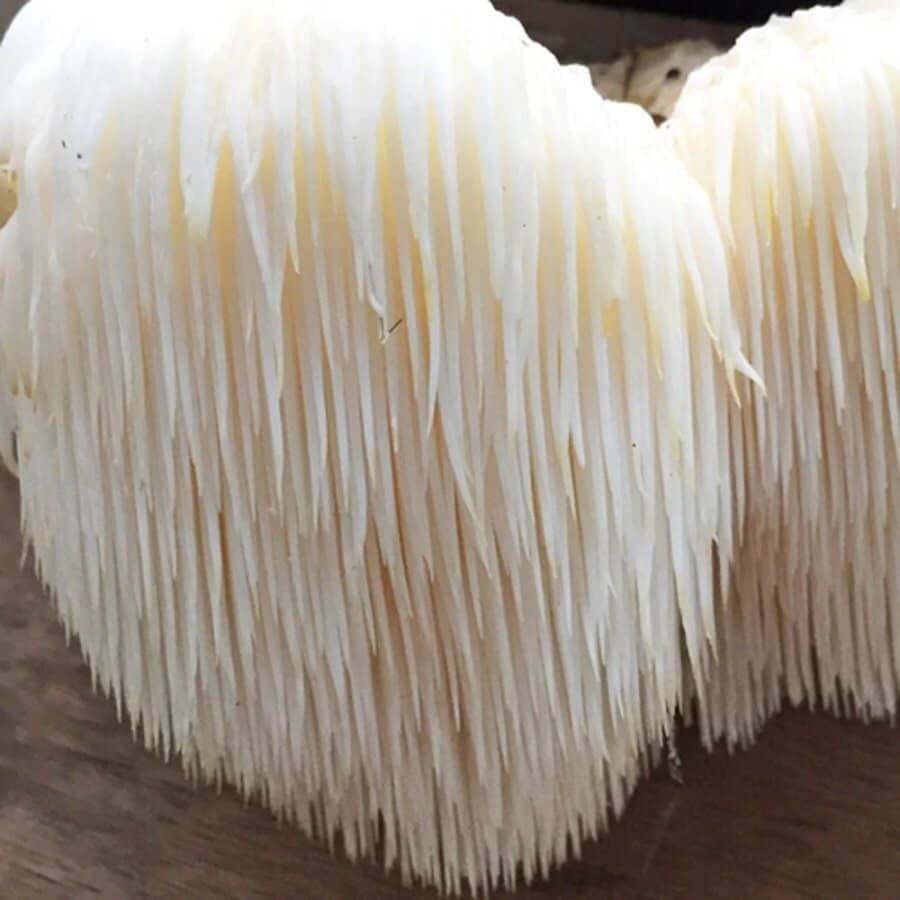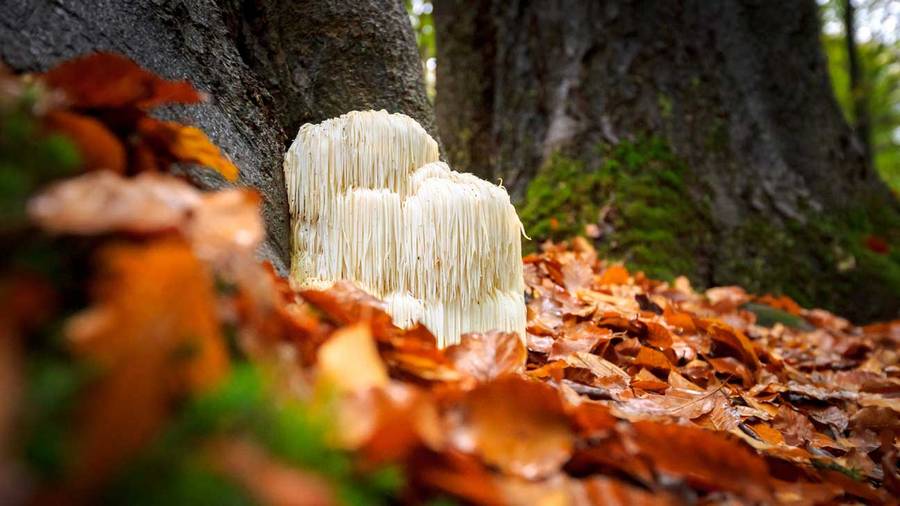
| Main centres: | 1-3 business days |
| Regional areas: | 3-4 business days |
| Remote areas: | 3-5 business days |
Lion's Mane capsules
Contents:
60 vegan capsules
Contains no additives or fillers - not irradiated
Lion's Mane Mushroom Extract 368mg
Polysaccharides 92,2mg
Suggested dosage:
Take 2 capsules in the morning with a meal and water, or as
suggested by your natural health care provider

Further information:
Source : https://draxe.com/nutrition/lions-mane-mushroom/
Thank you to Dr Axe
What would you think about eating a mushroom that looks a little like the scruff of a lion? Not totally convinced about lion's mane mushroom? What if I told you that it's associated with major brain repair, potential cancer-fighting power and is undergoing research on dozens of other health benefits?
Lion's mane mushroom is a nootropic* food very popular in traditional Chinese medicine. A large body of research has focused around this brain-boosting mushroom in the last few years, and the results are nothing short of astounding.
*Nootropics are a class of substances that can boost brain performance. They are sometimes called cognition enhancers or memory enhancing substances.
One study published in the Journal of Agricultural and Food Chemistry lists the benefits by stating lion's mane mushroom is "antibiotic, anticarcinogenic, antidiabetic, anti-fatigue, antihypertensive, anti-hyperlipodemic, anti-senescence [anti-aging], cardioprotective, hepatoprotective, nephroprotective, and neuroprotective, and improves anxiety, cognitive function, and depression."
Wow that's quite a list!
Whether you're interested in trying out lion's mane mushroom in your mushroom coffee, looking for the best lion's mane supplement or are just curious what this odd-looking fungus might be good for, I'm sure you're going to be impressed.
What Is Lion's Mane Mushroom?
Known in Latin as Hericium erinaceus, lion's mane is native to North America, Europe and Asia, although it's not cultivated widely in areas outside of Asia. It's sometimes referred to as Hedgehog Mushroom, Yamabushitake or Houtou, and it belongs to the tooth fungus, or hydnoid fungi, group.
Lion's mane mushrooms have long, dangling spines that are usually greater than a centimeter in length. Unlike most mushroom species, which have spines that project from a branch, the spines of Hericium erinaceus project outward, giving it that unique look of a lion's mane. These mushrooms grow on both living and dead broadleaf trees and are common in the late summer and fall months.
Research shows that lion's mane possesses anti-inflammatory, antioxidant and immunostimulating properties in cells, animals and humans. It has been used for thousands of years as a medicinal mushroom, especially among traditional Chinese medicine practitioners.
Like many powerfully beneficial foods, lion's mane mushroom has been known for some time in parts of Asia to be great for various body functions and conditions. Used in Japan for centuries and possibly millennia, the odd-looking fungus is revered by Buddhist monks and understood to be almost a mystical source of nutrition.
A sect of Buddhist monks known as the Yamabushi wear a garment known as the "suzukake," fashioned from many long strands of fur, that bears a striking resemblance to the lion's mane mushroom and probably accounts for why the mushroom is known in some areas as the yamabushitake.
Some sources state that it was reserved for royalty at different times in the past.
Benefits
1. Enhances Brain Function and Benefits the Nervous System
Maybe the most thoroughly researched feature of lion's mane mushroom is its impact on brain cells and related functions. This incredible fungus may have revolutionary impact on neurodegenerative diseases.
One method by which lion's mane affects brain function is by enhancing "neurite outgrowth" in the brain and related organs, according to research published in the International Journal of Medicinal Mushrooms. Neurite outgrowth refers to the growth of axons and dendrites from neurons.
That's a big deal in brain health research. By increasing this growth, it could potentially be possible to slow or reverse cell degeneration in the brain the main characteristic of diseases like Alzheimer's and Parkinson's.
A 2012 study conducted in Malaysia found that consuming lion's mane mushroom could actually regenerate damaged cells from peripheral nerve injury, an injury affecting the delicate tissue between your brain and spinal cord.
When studying how brain diseases might be affected by particular medications or treatments, scientists often use what is known as the PC12 cell line for testing. Extracts and various forms of lion's mane mushroom seem to have a major impact on PC12 cells, protecting them from damage and delaying their cell death significantly. This finding may prove to be extremely relevant for prevention or treatment of brain conditions.
An improvement of mild cognitive impairment in humans was also found in research published in Phytotherapy Research after eight to 16 weeks of lion's mane supplementation, although this improvement did not last after subjects stopped taking this supplement.
The danger of ischemic injury (damage caused by a lack of blood flow) to neurons is also of significance when you're talking about brain damage and disease. In laboratory tests conducted in Taiwan, lion's mane mushroom has been shown to help prevent this type of injury.
Taking lion's mane supplements has also been found to have potentially protective effects on the spread of Parkinson's disease, another neurodegenerative disorder, according to animal research published in the Journal of Translational Medicine.
While this research is still in its infancy and has not progressed to large-scale human trials in most cases, the consistent effect lion's mane mushroom has been found to have on brain cells should not be ignored.

2. May Help Protect Against Cancer
Lion's mane may also be significant in helping treat cancer, according to a host of research. In varying degrees, compounds from or supplementation with lion's mane mushroom has been found to potentially slow the progression or reverse the spread of:
Leukemia
Gastric ...